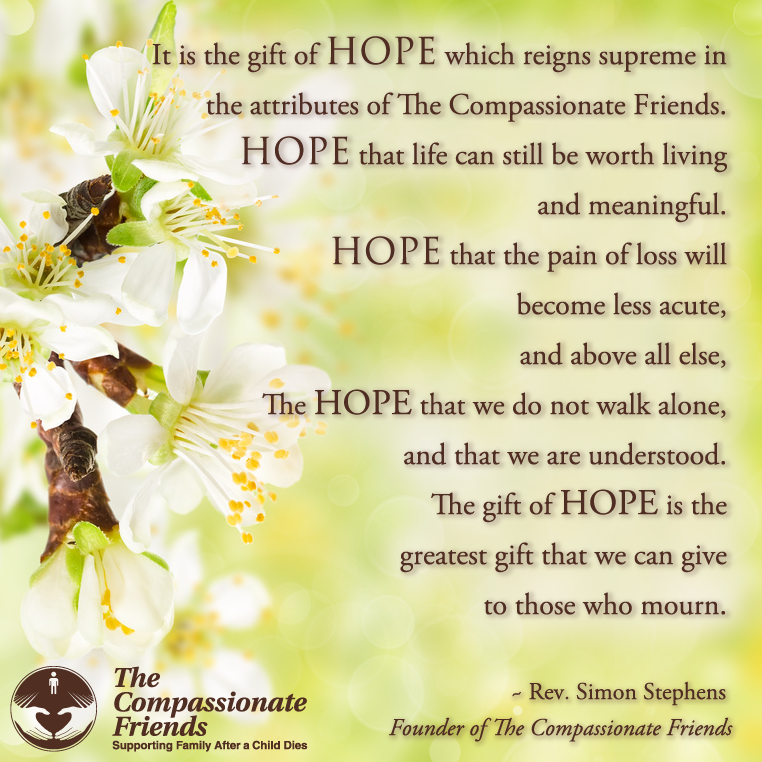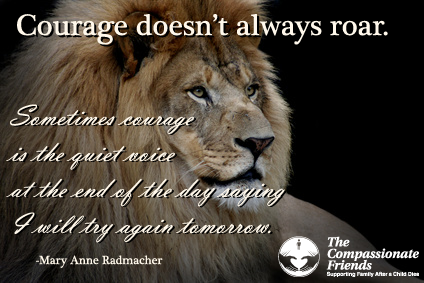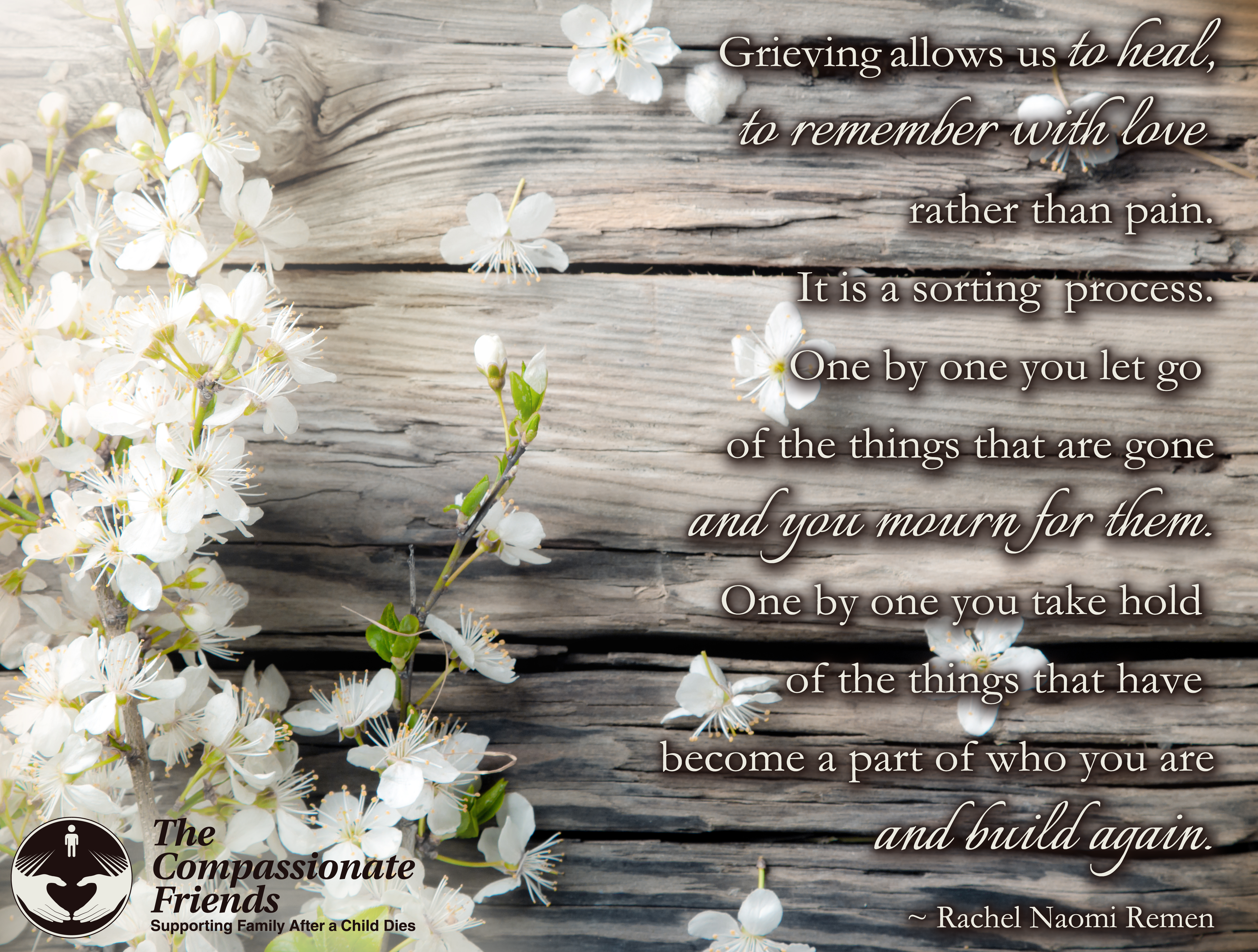Hope Defined
Posted on December 18th, 2017
After my daughter Rachael died in 1992, my husband and I received a letter from the local TCF Chapter. Rachael died in March, we went to our first meeting in July. We sat outside in the car, debating whether or not we were even going to go in. We wondered how on earth it could be any help to us to sit in a room full of people who were all so sad. But we did go in. We sat silent and shell-shocked – as I am sure many of you did at your first meeting. But as the meeting progressed we heard other parents tell about their child and about how they were managing on their grief journey. We saw (and felt) the encouragement members gave to one another. We saw and felt the understanding focus that was put on each parent as they spoke of their beloved child.
I don’t remember a lot of details about that first meeting, but I do remember thinking – as I saw and listened to – those who were two, five and even ten years down the road on their grief path, that somehow this monstrous event that had overtaken our lives must somehow be survivable and that these caring people would help me find my way back to life. That night they lent us some of their hope and that was a gift beyond measure.
HOPE can stand for many things. Hope is like a scout that goes out ahead into that unknown territory known as grief. That scout lets you know that you can travel there, you can survive this “landscape without gravity”. Let’s take a brief look at some of the possibilities of what TCF members offer when they lend us some hope:
 H –
H –
- TCF offers us help in learning how to heal when we don’t know where to begin.
- TCF offers us a hand to hold when we feel lost and a reassuring hug when times are tough.
- TCF offers us an opportunity to be honest about our feelings without fear of judgment or censure.
- TCF shows us that happiness can again be possible as we move once again into life honoring our child’s memory as we go.
O –
- TCF gives us an opportunity to be open and forthright in expressing our deepest emotions.
- TCF gives us an outlet for our anger, frustration and guilt.
- TCF provides ongoing outreach and support when those in our other support systems may have receded or disappeared altogether as our grief journey moves from days and weeks into months and years.
- TCF offers us a sense of optimism that life can be good again and that the intense pain of early grief will not last forever.
P –
- TCF helps us gain perspective on what we are experiencing, yet has the patience to listen to our story as many times as we need to tell it.
- TCF offers us a place where we may feel safe and protected as we share our pain and our memories.
- TCF offers us the promise of more inner peace as we move towards a place of remembering more about our child’s life and dwelling less on the circumstances of the death.
- TCF helps us understand the need to pardon ourselves for any mistakes we may feel we made as parents and not to blame ourselves for our child’s death.
E –
- TCF provides education about the grief process so we may better understand and cope with what is happening to us.
- TCF offers encouragement that our pain will not always be so great and that we will survive.
- TCF members provide the true empathy that only those who have walked our path can know.
- TCF offers us a chance to express what is in our hearts and embraces us with understanding.
TCF’s Vision statement is “That all who need us will find us, and that all who find us will be helped” HOPE is a huge part of that help.
~Susan Chan, Rachael’s Mom
Topeka TCF Chapter, Topeka, KS


The Things I Have Learned About Grief
Since the Death of My Child
- Grief is not an event, it is a process. It does not have a distinct finish line. It takes each person a different amount of time to do their grief work – each person’s journey is as unique as their fingerprints.
- Grief is unique for each person because of the relationship they had with the child who has died. That relationship was also unique. It is different for a father, different for a mother, different for a surviving sibling. Your grief journey will be guided by many things besides the relationship you had with the child who died. It will be influenced by your past life experiences (including previous losses); your religious beliefs, your socio-economic status, your physical health, the availability of a support network, and, in many cases, the cause of the death itself.
- People want you to be “over it” way sooner than you can ever imagine that as a remote possibility. They don’t seem to understand that this is not the flu and we don’t get “over it”, we learn to integrate it into the fabric of our lives. People want us to be back to our “old selves again” but what they don’t realize is that we will never be the same people we were before our child died. One of our tasks as we make our grief journey is to redefine who we are in this new reality that we did not choose.
- Grief is not a predictable journey and sometimes feels as though we are on a roller coaster. One day we may feel somewhat stronger and feel we are making progress, the next day we may crash and burn. Grief is sometimes like winding a ball of yarn – you wind and wind on it and sometimes drop it and it unravels before you – then it is time to start winding it up again. Grief can be like that. It is unrealistic to think that things will be “normal” again because they won’t be the “normal” we have always known. It will be part of our job to define our “new normal” – an existence without that child’s physical presence.
- It is important to remember that as we grieve, we must also mourn the death of our child. The two words are usually used interchangeably, but they mean different things. Grief is on the inside – what we are feeling inside. Mourning is “grief gone public” – in other words how we are allowed to express our grief outside of ourselves.
- We have a great need to tell and retell our story far longer than many people are willing to listen to us. We need to find safe places to tell our story and continue to talk about our child. This is probably one of the greatest values of a TCF Chapter. Being part of a TCF Chapter also helps to validate what we are feeling and helps to make us feel less alone.
- Pain is part of the grief process and cannot be ignored or “gotten around” if we are to heal. You must integrate and process the pain to get to the other side of it – to the place where healing can start taking place. There is a Buddhist saying… “In order to heal, you have to lean into the pain.” While grief and pain are inevitable in most people’s lives, misery is optional. I am sure you have heard the expression “we cannot change the wind, only the direction of our sails.”
- Remember that letting go of the pain does not mean letting go of the love you had for your child. That love will remain with you always.
- I think at some point each of us must make a conscious decision to heal. We must decide whether or not we want to become bitter or better. I believe each of us has the tools within us to heal, but we must listen to our inner voice to tell us how to proceed.
- Everyone seems to have an explanation for why this happened to you. It is a characteristic of our society that we want to be problem solvers, so people often feel they have to provide us with some kind of explanation. I haven’t met a bereaved parent yet who felt there was a reasonable and acceptable explanation for why their child had to die.
- I also think we need to be selfish as we grieve. By this I mean we must be good to ourselves, be patient with ourselves, look to what we need to do to move forward. Sometimes we get so busy caring for and nurturing others, we neglect to nurture ourselves. Remember, the word grief means “to carry a heavy burden”.
- We need to be open to the help others can provide. This is not a journey we need to make alone. Let people help you. Ask for help when you need it. Asking for help is not a sign of weakness, but an acknowledgement that you want to heal.
~Susan Chan, Rachael’s Mom, Topeka, KS
 H –
H –



